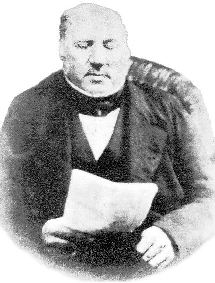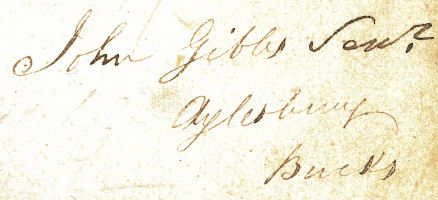|
Ancestors of Christopher Finch Reynolds John Gibbs(19th May, 1792 - 10th March, 1860) |
|
||||
|
Ancestors of Christopher Finch Reynolds John Gibbs(19th May, 1792 - 10th March, 1860) |
|
||||
 John Gibbs
is my great great grandfather and the grandfather of Walter
Richard Locke. He was the son of Robert
Gibbs and his wife Ann Miller, of
Aylesbury. As he was born, lived and died in Aylesbury,
Bucks, I
would not normally list his details on this web site, and in any case a full listing would
take many pages. However he was a very
successful businessman, and a number of his activities relate to Hertfordshire.
John Gibbs
is my great great grandfather and the grandfather of Walter
Richard Locke. He was the son of Robert
Gibbs and his wife Ann Miller, of
Aylesbury. As he was born, lived and died in Aylesbury,
Bucks, I
would not normally list his details on this web site, and in any case a full listing would
take many pages. However he was a very
successful businessman, and a number of his activities relate to Hertfordshire.

1824: The Corporation Records of St Albans: Court held December 1st: The Corporation seal was affixed to an assignment of the lease of the Clock Tower from William Brown to George Washington Gibbs, who, with his brother, Mr. John Gibbs, of Aylesbury, executed a bond for the payment of the rent and performance of the covenants of the lease.
While George Washington Gibbs apparently failed to make a success of this business, his youngest brother Richard Gibbs continued the printing business and became a very successful businessman in St Albans. Richard founded the newspaper first know as the St Albans Times and now known as the Hertfordshire Advertiser in 1855. (Many of the Old News extracts come from this paper). This led to the formation of the company Gibbs and Bamforth, which published books such as The Corporation Records of St Albans and The City of St Albans. The newspaper side later became Home Counties Newspapers. Richard's grandson, Arthur Ernest Gibbs, was a founder of the City Museum, St Albans, and was involved in many other related activities.
1825: Caroline Gibbs (3rd October, 1825 - 10th January 1898) was born. She married John Locke at Hale Leys Chapel, Aylesbury on 6th September 1849
circa 1830: It is possible that John Gibbs was a correspondent of The Times - providing news items for the paper. See . See Registration of the Children of Dissenters
1835: John Gibbs was one of the original investors in the Aylesbury Railway, which, in part, runs across Hertfordshire near Long Marston.
1836: John Gibbs finances the Aylesbury News (later Buckinghamshire Advertiser) which often contains news of the adjacent parts of Hertfordshire.
|
THE FLAIL Old John Gibbs of Aylesbury, founder and first editor of The Aylesbury News, who combined auctioneering with a bit of pawnbroking, money-lending, printing and eventually newspaper publishing, was a firebrand. A Reformer to the backbone and a fervent Radical, he called himself a Liberal and proceeded in his paper to smite the Tories hip and thigh. By present day standards, old John Gibbs ought to have had a dozen writs for libel after every issue. If you may be tempted to wonder why newspapers today do not vilify and scourge the public individually and collectively with the venomous epithets of those days, remember, please, that the public is today more thin-skinned and more knowledgeable of more precise libel laws than it was then. By comparison with John Gibbs, our portion today is milk and water. What do you think would happen to an editor today who published - as John Gibbs did - of Lord Chandos, M.P. : "During the past week Lord Chandos has been adopting his usual course of bribery by distributing hares, etc., among those in this neighbourhood who have been in the habit of supporting him." Of Mr. Benjamin Disraeli, in a letter from a correspondent who would not sign his name: ". . . I have no doubt that the time will arrive when the presumption of this hireling scribbler and unprincipled politician will be stayed and when his short-lived fame will be buried in his eternal degradation." and of a contemporary in a neighbouring county ; ". . . an obscure print, devoid of both talent and circulation." and of the County Bench of Magistrates; ". . . they consist principally of parsons who have been made Magistrates, to induce them to use the influence they possess amongst their parishioners for the advancement of Toryism; and greater zeal is used by them in the acquirement of political influence than in the pulpit." and of a Tory dinner at Brill : "Our reporter left the room quite sober, which we fear was not the case with all the parties present." and of three ladies of Tingewick : "Three common street walkers had the impudence to perambulate the streets and public roads of Tinge wick on Tuesday last in open daylight-namely; (and here followed the names of the three women). Why are not the parish constables on the alert? Why will they suffer the morals of the parish to be contaminated by harbouring such characters? " John Gibbs, the founder and first editor, soon handed over the editorship to his son John, but this young man died at an early age and his brother Robert succeeded to the post. Even so, the power behind the editorial throne was the old warrior John. Week by week he used The Aylesbury News as a flail. He scourged the Tories. Nobility, clergy, landlords and the squirearchy alike felt the lash. Never a week went by without he drew some blood. He was a true champion of the common man. Old John pursued his great crusade to the last. He died in 1860 at the age of 68 and he had the satisfaction of seeing many of the principles for which he fought, become part of the constitution of the British way of life. Family Group, 1952 |
1854: John Gibbs (widower) married Sarah Rolls (first cousin of his first wife, Mary Rolls and sister of Frances Rolls, the wife of his brother Richard Gibbs of St Albans) at the Independent Chapel, St Albans. (Interestingly this cousin marriage was not approved of - as the entry is vigorously deleted in the Locke family bible, currently with cousins in Australia.)
An Aylesbury Reformist (word format) - Article on John Gibbs drafted in 1995
If you can add to the information given above tell me.
Page updated July 2007